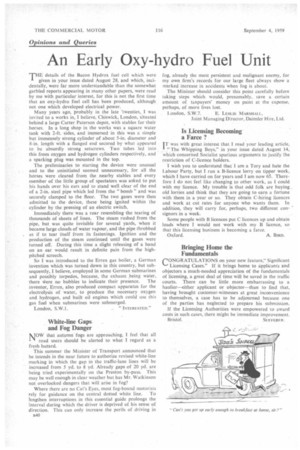An Early Oxy-hydro Fuel Unit
Page 74

If you've noticed an error in this article please click here to report it so we can fix it.
THE details of the Bacon Hydrox fuel cell which were given in your issue dated August 28, and which, incidentally, were far more understandable than the somewhat garbled reports appearing in many other papers, were read by me with particular interest, for this is not the first time that an oxy-hydro fuel cell has been produced, although not one which developed electrical power.
Many years ago, probably in the late 'twenties,. I was invited to a works in, I believe, Chiswick, London, situated behind a large Carter Paterson depot, with stables for their horses. In a long shop in the works was a square water tank with 2-ft. sides, and immersed in this was a simple but immensely strong cylinder of about 5-in, diameter and 8-in, length with a flanged end secured by what appeared to be absurdly strong setscrews. Two tubes led into this from oxygen and hydrogen cylinders respectively, and a sparking plug was mounted in the top.
The preliminaries to starting the device were unusual and to the uninitiated seemed unnecessary, for all the horses were cleared from the nearby stables and every member of the little group of spectators was asked to put his hands over his ears and to stand well clear of the end of a 2-in, steel pipe which led from the " bomb " and was securely clamped to the floor. The two gases were then admitted to the device, these being ignited within the cylinder by the pressing of an electric switch.
Immediately there was a roar resembling the tearing of thousands of sheets of linen. The steam rushed from the pipe, but was quite invisible for several yards, when it became large clouds of water vapour, and the pipe throbbed as if to tear itself from its fastenings. Ignition and the production of the steam continued until the gases were turned off. During this time a slight releasing of a hand on an ear would result in definite pain from the highpitched screech.
So I was introduced to the Erren gas boiler, a German invention which was turned down in this country, but subsequently, I believe, employed in some German submarines and possibly torpedos, because, the exhaust being water.
there Were no bubbles to indicate their presence. The inventor, Erren, also produced compact apparatus for the electrolysis of water, to produce the necessary oxygen and hydrogen, and built oil engines which could use this gas fuel when submarines were submerged.
London, S.W.1. " INTERESTED."
White-line Gaps, and Fog Danger
Now that autumn fogs are approaching, I feel that all road users should be alerted to what I regard as a fresh hazard.
This summer the Minister of Transport announced that he intends in the near future to authorize revised white-line marking in which the gap in the traffic-lane lines will be increased from 5 yd. to 8 yd. Already gaps of 20 yd. are being tried experimentally on the Preston by-pass. This may be well enough in clear weather but has Mr. Watkinson not overlooked dangers that will arise in fog?
Where there are no Cat's Eyes, most fog-bound motorists rely for guidance on the central dotted white line. To lengthen interruptions in this essential guide prolongs the interval during which the driver is deprived of his sense of direction. This can only increase the perils of driving in B40 fog, already the most persistent and malignant enemy, for my own firm's records for our large fleet always show a marked increase in accidents when fog is about.
The Minister should consider this point carefully before taking steps which would, presumably. save a certain amount of taxpayers' money on paint at the expense, perhaps, of more lives lost.
London, S.W.7. E. LESLIE MARSHALL, Joint Managing Director, Daimler Hire, Ltd.
Is Licensing Becoming a Farce ?
IT was with great interest that I read your leading article, a ." The Whipping Boys," in your issue dated August 14, which concerned Socialist spurious arguments to justify the restriction of C-licence holders.
I wish you to understand that I am a Tory and hate the Labour Party, but I run a B-licence lorry on tipper work, which I have carried on for years and I am now 65. Therefore I do not feel like changing to other work, as I could with my licence. My trouble is that odd folk are buying. old lorries and think that they are going to earn a fortune with them in a year or so. They obtain C-hiring licences and work at cut rates for anyone who wants them. In addition, they will carry for, perhaps, two different consignors in a week.
Some people with B licences put C licences up and obtain loads where I would not work with my B licence, so that this licensing business is becoming a farce.
Oxford. A. BIRD.
Bringing Home the Fundamentals
CONGRATULATIONS on your new feature," Significant ‘.-" Licensing Cases." If it brings home to applicants and objectors a much-needed appreciation of the fundamentals of licensing, a great deal of time will be saved in the traffic courts. There can be little more embarrassing to a haulier—either applicant or objector—than to find that, having brought customer-witnesses at great inconvenience to themselves, a case has to be adjourned because one of the parties has neglected to prepare his submission.
If the Licensing Authorities were empowered to award costs in such cases, there might be immediate improvement.
Bristol. SUFFERER.




















































































































